- Home
- Aeryn Leigh
Hellsbaene: Odin's Warriors - Book 1 Page 2
Hellsbaene: Odin's Warriors - Book 1 Read online
Page 2
"Morning Mummy,” said Amelia excitedly, "look what I'm doing!" The eight-year old, but almost nine-year old she'd say, thought Ella, because time moves with glacial slowness for a child, so every month is damn important, held up a teddy bear, and a cape, and resumed sewing a pocket on the swirling purple fabric. "See, it's a pocket, for leaving messages in. You place the bear at the door of the person you want to leave a message for in the morning." Amelia moved the mouse-brown, long wavy hair that fell from her head behind her ear, and got back to the critical task at hand.
"Morning Amelia." Ella stood, pulled back to simple reality, by the hope, the innocence of childhood, of a girl who had yet to be hammered on the anvil of lived experience.
It became too much, and she retreated to her room, head pounding.
Thank you, child.
Her heart beat wildly, the anxiety roared within still, but this was enough, an antidote, of sorts.
But one more flight accident, even if not her fault, and it all would end. She just made it to chamber pot, and threw up until she dry-heaved.
Never give up. Remember who you are. Where you've come from. What you've done.
Ella cleaned herself up, and brushed her teeth, wondering about the tall woman staring back at her in mirror.
She dressed quickly, since she had slept-in this morning, but still on schedule.
Time to go to work.
She quickly put on make-up, brushed her blonde hair free of all the knots, and tied it back in a low pony-tail. Ella picked up her gloves, and tucked them inside her jacket, next to her heart. Kissing her child on the forehead goodbye, she nodded to Victoria, her friend, and Amelia's nanny, and with a resolute breath, opened the front door, and entered the world outside.
The village, on the outskirts of Magdeburg, which she called her current home, lay fifteen minutes by motorcycle from the airbase. The villagers she passed on the road looked dour, and harried. They looked up into the sky, as if expecting death to come their way at any moment. Some waved to her, others just nodded heads, but to them, she was military, and therefore, not one of them. The increased food rations and the small private chateau she had for herself, Amelia and the nanny being proof enough of that.
But not SS. Not of one of Them. Then there would have been no wave, no nod at all. Just fear.
The times had changed.
She rode the BMW R12 sidecar past the town hall, through the village centre, past the line of civilians queueing for their daily bread from the baker, feet shambling in the dry dirt, horses tethered to one side, carts on the other, then once clear of traffic, twisted the throttle and the machine purred with power, leaping forward, riding towards the Luftwaffe aerodrome, the wind in her hair, all worries forgotten.
Chapter Three
The Sky Is Blue
Outside, the sky blue and fresh, not a cloud to see, and the birds chirped. A hand picked up a pen, and wrote in a battered red diary:
Today the sky is blue, birds chirp. Today is the day I die.
The diary closed. Squadron Leader Lawrence “Laurie” John stood up from his bed and, still stiff with fatigue, walked to the mirror. Laurie looked into his own eyes, saw the pain reflected there, and wrenched his gaze away.
A moment of silence, then the sound of heavy boot steps outside, and a dog, his dog, playfully barked.
"Hello, Skippy,” said a familiar voice, "who's a good girl eh? Who’s a good girl, you big old puppy dog you..." The adult voice turned into something more childish, which Laurie thought, is what happens when certain dog lovers gain proximity to canines and their intelligence diminishes in return.
There was silence, a suspicious silence, then the sounds of a large jaw crunching soft bones and the rhythmic thwack—thwack—thwack of a heavy tail beating into the side of the kennel.
Squadron Leader John walked to the wooden door, and opened it. A large furry German Shepherd made short work of a thigh bone, her head poking out of her kennel, and there stood Flight Sergeant Bloomsbury, beaming like a proud Uncle — which of course, he was in a sense, reflected Laurie.
The stocky man wiped the traces of bones from his hands with a handkerchief, which he stuffed back into a side pocket of his uniform issued coveralls.
"Morning, Andrew,” said Laurie. He raised an eyebrow, seeing the bone or what remained of it.
And for that matter too, what was left of the morning.
Damn insomnia.
"Morning Sir,” replied Sergeant Bloomsbury. "Fine day, isn't it?"
Laurie grunted. "Yes, it is," he said, looking around, seeing the aeroplane hangars and smaller buildings busy with signs of life, as Her Royal Majesty's Royal Air Force Waddington's personnel continued their round the clock routine.
For the long-suffering mechanics and ground-crews, their only reward for finishing work, well done, was more hard work. They worked all day, all night, in 1944, as hard as they did in '40.
"Where the bloody hell did you get that bone?" he said, scratching his head.
Andrew beamed even more. "Funny you say that, did a spot of dancing last night at the Boar, and I may have just danced a wee bit too hard and broke the landlord's favourite pint glass. Not to worry, I traded a new pint glass and the promise of being available for next week’s home match against Leicester down the road."
Andrew didn't play cricket. Laurie did though, or used to.
"Let me guess," he said, "you said I would love to help the team out?"
"Absolutely,” grinned Andrew, "got to keep your eye in, eh? Smashing. Lanky guy like you, fast bowler..."
"Tremendous" said Laurie the Cricket Fanatic, smiling, and then the optimism faded and once again stood sorrow, Squadron Leader Lawrence John, veteran of one World War, and now in a second.
"Fuck." He walked over to Skippy, knelt, knees creaking, and scratched her ears then down along her spine.
The impromptu mascot of No. 463 R.A.A.F. squadron, almost full-term pregnant, devoured the bone. "You still haven't told me where it came from."
Sergeant Bloomsbury began to speak but the air raid siren split the air. Like lightning Laurie removed the chain from Skippy's kennel and all three ran towards the nearest dugout, only just around the corner from the Officer's Mess.
"Morning, Sir, Sergeant," said Chief Technician Thomas 'Bear' Halford, in amongst a pile of other men, officers and non-commissioned alike that poured into the shelter.
"Morning, Bear," said Laurie, grimacing, looking in the direction of the siren blasting. The air-raid siren, quieter inside the shelter, aggravated his tinnitus.
Thomas, wireless operator wizard, gave Skippy a reassuring pat and sympathised with the poor animal. And his squadron leader if the tinnitus rumours were true. Ears are so sensitive, he thought, poor buggers.
"So, what's flown up Jerry's arse this morning, do you think?" said Andrew. "A pint says it's a blooming V2." All he had to go on was barrack talk – no one had seen the Nazi flying rocket bomb.
Skippy barked at the mention of the word.
"Aha!" said Andrew, patting the dog. "You're such a good girl yes you are."
"No, it's bombers," said Thomas, and then the two started arguing, as Skippy just sat there soaking up the attention above her, amongst the hubbub of the shelter.
If Laurie could have rolled his eyes, he would have.
Skippy's just reacting to the attention and commotion.
He left them and made his way over to his wing commander, who'd just dispatched a runner.
"Morning, Sir," he said.
"Morning, Lawrence," said Senior Wing Commander Billy Hayes.
You know I hate being called that, but being the prick you are, do it anyway. “Sir.”
"Jolly good. Ready for tomorrow's mission? How are you finding the replacement crew for your crate?” said the wing commander, oblivious to what Laurie just said. He generally asked questions not caring about the answers, deep in the paperwork clipped to the ever-present board. "Right, right," he said, not even waiting for the r
esponse.
Bastard.
"I'll sort them out right enough," said Laurie, glancing back to look at Skippy.
There was a roar unlike nothing a propeller-driven plane could make, followed by loud cheering, then people started running up the wooden steps back to open air.
"Sir," he said, saluting, received a cursory nod in return, and joined the rest of the men outside.
Someone had killed the air-raid siren, and just as Laurie made it to the top of the steps, a Supermarine Spitfire fighter screamed overhead in the direction of the fading jet-turbine roar and to the continuing cheering of the men.
"Aha," yelled Andrew. "I was right."
"No," said Laurie, "that's a Gloster Meteor which first passed overhead, and this, gentlemen, has been a practice exercise. On my day off." He looked at Sgt. Bloomsbury.
"And I'm going to the pub. C'mon Skippy."
Chapter Four
Liquid Lunch
Squadron Leader John, a survivor of trench warfare, stared down the pair of Military Police that had come into the pub, ostensibly just for a look.
Ha, yeah right. They left. He waved, gave their backs the finger, and took a sip of the pint, and sighed. Up the furthest rear corner of the noisy English pub at lunch-hour, in the darkest section of the smoke-filled room, alone, Laurie continued to exude an aura of ‘Bugger Off’.
Skippy laid at his feet under the rough wooden table. At least animals are genuine in their affection. And temperaments.
He took a long drink, felt the cold liquid swirl down his throat, the alcohol dulling the pain.
I'm too bloody old to be doing this shit. Forty-two. And a bomber squadron leader to boot. Surrounded by downy-faced new recruits that come and go and die only half my age.
He sighed, picked up the beer coaster and started tearing it up.
First question, cadets. It's March 1944, and the Royal Air Force and Commonwealth has a bomber loss of around six percent per mission. The Americans aren't doing so good either. But let's stick to us.
He dropped bits of the cardboard onto the sticky wooden table.
So, for every one-hundred bombers that leave to bomb a target in Germany, Norway, or Occupied France, how many make it back? And on every bomber seven men? The RAF can barely cover the loss of personnel, and increase its roster, as it is. What might happen if losses increase?
He downed the remaining beer and signalled the barman for another.
Second question. The .303 machine-guns in our Lancaster's are useless against German fighters. Why are we still using small calibre guns when the Americans have way bigger and more effective defensive armaments in their bombers? Is it psychological reinforcement for our crews or is it just British Bomber Command stuck up its own arse? And for that matter, why is the Lanc's escape hatch so god damned bloody small?
It just makes me so mad. Straightforward engineering solution but no. He raised the fresh pint, and chugged half of it straight down. Christ, I could murder a decent steak right now.
Third and final question, young ones. Russian Roulette? Heard of it? We play nightly on a majestic, macabre scale. The men that die in your arms, the bomber that explodes above and next to you, mean you never think of it as a question of if, but when. Night after night, week after week, climbing into these death-traps, wondering if it's your turn to catch Death's Express that's taken all your mates before you.
Lawrence dipped his fingertip in the small puddle of beer under the pint glass, drew it around in circles on the rough, brown wood.
Around and around you go, stopping all stations, hoping for the miracle you last to thirty stations, thirty missions and then the chance of going home after completing a tour. That's if you go home. Society and expectations mean they have you by the balls, so, like a hero, you re-enlist for another tour. Why is that? Camaraderie? What?
But.
Never have I served with finer men. Every fucking man that flies in Bomber Command is a hero.
And when you get home tonight — lie in the dark and listen.
Bloody hell.
Snapping out of the dark monologue spiralling down and down, due to Skippy’s teeth embedded in his right shoe, or more to the point, his big toe, Laurie called the barman for one final round, and patted his impatient dog.
Chapter Five
Hello Beautiful
The Daimler-Benz half-track troop carrier rattled as Ella overtook it. The soldiers on the deck called out to her, jeered, whistled, and waved.
Keep smiling boys, there's not a lot else to smile about these days.
Her leather-gloved left hand waved back.
She rode on, down the back dirt-track that twisted and turned until she came to the aerodrome.
"Fraulein Ella," said the side-gate guard informally.
No Heil Hitler here.
"Corporal,” she said, saluting, handing over her papers. The corporal looked at them, handed them back, saluted and raised the wooden barrier. She rode onto the Luftwaffe base Magdeburg. Past the Russian forced labourers filling up bomb craters beside the runways, past the lines of oil, gas and ammunition trucks and carts, and then rolled up to a building more camouflaged and defended than the others.
Experimental Testing Headquarters.
Luftwaffe soldiers manned the trio of 88mm anti-aircraft guns that stood on the rooftop, eyes forever alert and on edge. Tension filled the air, as Allied air raids become ever more frequent. Incessant.
The BMW's spoked wheels crunched to a halt on the damp gravel, next to the other parked bicycles and motorbikes. Ella dismounted and glanced towards the door. She saluted to the guard and, straightening her jacket, walked towards the building ignoring his leering stare. She was home.
Men and women occupied the foyer, the sounds of typewriters and telegrams being punched and keyed, a steady workload from the Luftwaffe Test Facility, all manner of aeroplanes being trialled, tested, and invented here, a smoker’s cloud of blue bouncing thick off the ceiling.
Aircraft, from the wacky, to the absurd, to the terror-inducing rocket lunacy.
Pictures and paintings of bi-planes, tri-planes, mono-winged planes, of propellers and jets and rockets, hung on the walls. The portrait of Adolph Hitler stood prominently, larger than the others, but added almost as an afterthought, obscuring some of the frames in a haphazard manner.
She walked to her desk.
"Heil Hitler!" said a voice behind her. She stopped, and turned to see a new figure in the doorway. Collectively, all the men and women stopped and returned the greeting, Ella included, right arm raised, extended. Ella's arm returned to her side, the rote greeting by reflex.
He walked up to her. She could smell the French aftershave. Expensive.
"Fraulein Ella, so good to find you here," said SS Colonel Grieg, devout Nazi.
"Colonel," she said, trying to sound friendly. "What brings you here? I thought you were in Berlin?"
He ignored the question. Looking around the room, everyone had returned to their tasks, but quieter, air sucked in with anticipation and dread.
"I understand you will be flying again today? Try not to smash it like last time," he said. Then his voice dropped to barely a whisper. "But then, I hope you do. A bitch like you does not deserve to be up in the air, when her true role for the Fatherland is in the kitchen, and well..." His gaze lingered over her uniform, then back into her eyes.
"One more accident, and you're mine."
He smiled without warmth, and walked back to the door. "Heil Hitler!" Grieg left, slamming the door.
Ella's stomach fell off a precipice.
He never lets up. Ten years of harassment. Bastard.
Never show weakness, never show them how much they get to you.
Win.
Breathing out, she mentally straightened, told her guts to get straight, took a deep lungful of cigarette-riven air, and walked into the adjoining room.
Even now, with the war well into its fifth year, she still felt like a little child every time sh
e lived her dream.
Flying. She was flying!
She had been so fortunate to have an understanding mother and father, who encouraged her interest and dream and gave her gliding lessons at the local gliding club at eleven. And from there, it really snowballed.
No longer content to fly non-powered aircraft — old rickety bi-planes, leftovers from the Armistice of 1918 fascinated her even more.
No matter if she was covered in engine oil from head to toe, except for clean spots under her goggles.
This was freedom.
And also, death, all too often. The old WWI planes were cantankerous, tetchy, war weary and would cut out at the most inopportune moments. Ella thought of her two close friends, dead by her twentieth birthday, victims of their own addiction to this pursuit of the dream.
But she could no more stop her willingness to fly than an eagle could stop hunting.
It was inside her.
Those other tiny voices in her head, she ignored. And so, for a decade, she had become a stunt pilot, then a test pilot with the formative Luftwaffe.
Something newer, faster. Pushing the edge, the razor's blade of uncomfortable.
Being a woman, well, that was just a bonus, as much as it was tiresome, irksome drag.
Do I know what an aeroplane is? Really? Verpiss dich.
Amelia finished sewing the button clasp on the teddy bears cape. "See Victoria". She thrust the bear out. "Messages!"
Victoria looked at Amelia and smiled.
"Well done," she said, "and now it is time for maths." She rolled up her sleeves, exposing the soft, blonde hair, glinting in the morning sunlight that fell through the open kitchen windows, their shutters open. The kitchen smelled fresh and clean. It certainly didn't look clean, the table one giant mess of sewing kits, yarns, fabrics, balsa wood, glue, and colouring pencils.

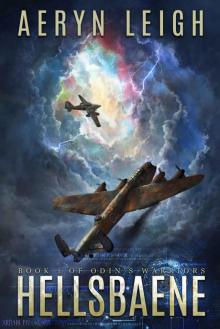 Hellsbaene
Hellsbaene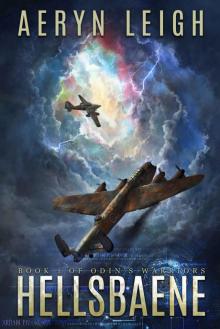 Hellsbaene: Odin's Warriors - Book 1
Hellsbaene: Odin's Warriors - Book 1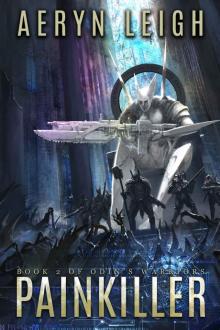 Painkiller: Odin's Warriors - Book 2
Painkiller: Odin's Warriors - Book 2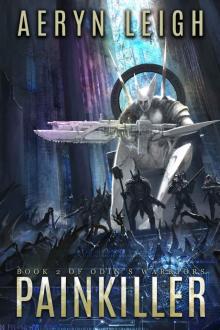 Painkiller
Painkiller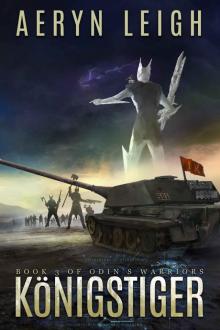 Königstiger: Odin's Warriors - Book 3
Königstiger: Odin's Warriors - Book 3